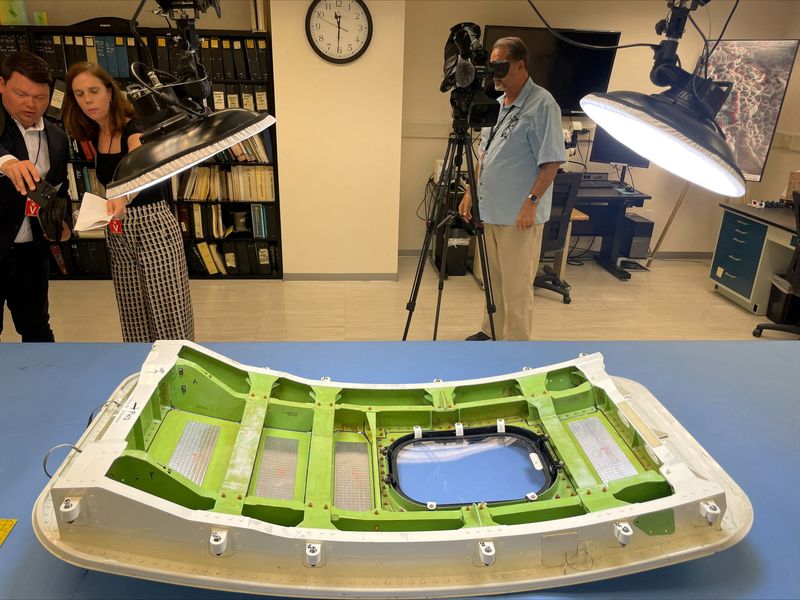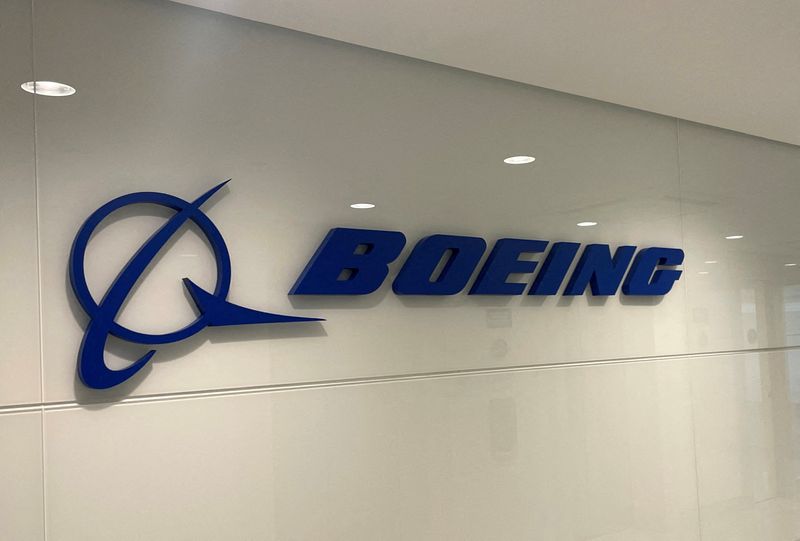By David Shepardson, Allison Lampert, Abhijith Ganapavaram and Tim Hepher
WASHINGTON (Reuters) -Boeing said on Tuesday it plans to make design changes to prevent a future mid-air cabin panel blowout like the one in an Alaska Airlines 737 MAX 9 flight in January that spun the planemaker into its second major crisis in recent years.
The National Transportation Safety Board and Boeing (NYSE:BA) said they still have not determined who removed and reinstalled that plane's door plug during production.
NTSB completed the first of two days of hearings Tuesday that lasted nearly 10 hours into the mid-air emergency that badly damaged Boeing's reputation, led to the MAX 9 grounding for two weeks, a ban by the Federal Aviation Administration on expanding production, a criminal investigation and the departure of several key executives.
Boeing's senior vice president for quality, Elizabeth Lund, told the hearing the planemaker is working on design changes that it hopes to implement within the year and then to retrofit across the fleet to prevent a future incident.
"They are working on some design changes that will allow the door plug to not be closed if there's any issue until it's firmly secured," Lund said.
Investigators have said the door plug in the new Alaska MAX 9 was missing four key bolts.
The hearings are reviewing key issues, including 737 manufacturing and inspections, safety management and quality management systems, FAA oversight, and issues surrounding the opening and closing of the door plug.
Boeing, which has vowed to make key quality improvements, faced extensive questions at the hearing about the production of the accident-hit MAX 9 and lack of paperwork documenting the removal of the door plug.
NTSB Chair Jennifer Homendy on Tuesday criticized the planemaker's safety practices and said it must take steps to improve. "The safety culture needs a lot of work," Homendy said.
The NTSB will turn its attention on Wednesday to the FAA's oversight of Boeing, Homendy said. FAA Administrator Mike Whitaker said in June the agency was "too hands off" in oversight of Boeing before the accident.
"We have a lot of questions," Homendy said about FAA oversight of Boeing. "There was information known," Homendy said citing defects, missing and incorrect documents as well as incorrect policies that "have been issues for years."
Lund said two Boeing employees who were likely involved in the opening of the 737 MAX 9 door plug - a piece of metal shaped like a door covering an unused emergency exit - during production have been placed on paid administrative leave.
The board also released 3,800 pages of factual reports and interviews from the ongoing investigation.
Boeing has said no paperwork exists to document the removal of four key missing bolts. Lund said Boeing has now put a bright blue and yellow sign on the door plug when it arrives at the factory that says in big letters: "Do not open" and added specific requirements if the door plug must be opened and procedures to ensure it is not inadvertently opened.
A flight attendant in an interview with NTSB described a moment of terror when the door plug blew out. "And then, just all of a sudden, there was just a really loud bang and lots of whooshing air, like the door burst open," the flight attendant who was not named said. "Masks came down, I saw the galley curtain get sucked towards the cabin."
Doug Ackerman, vice president of supplier quality for Boeing, said Boeing has 1,200 active suppliers for its commercial airplanes and 200 supplier quality auditors.
Lund said on Tuesday Boeing's monthly MAX production is still "in the 20s", far fewer than the 38 per month it is allowed to produce. "We are working our way back up. But at one point I think we were as low as eight," Lund told the NTSB.
Last month, Boeing agreed to buy back Spirit AeroSystems (NYSE:SPR), whose core plants it spun off in 2005, for $4.7 billion in stock.
FUSELAGE DEFECTS
Jonathan Arnold, Aviation Safety Inspector at the FAA, said a systemic issue he witnessed at Boeing’s factory was employees not following the instructions.
"That seems to be systemic where they deviate from their instructions. And typically, tool control is what I see most," Arnold said.
Lund said before the Jan. 5 accident every 737 fuselage delivered to Boeing by Spirit AeroSystems had defects. "What we don't want is the really big defects that are impactful to the production system," Lund said. "We were starting to see more and more of those kinds of issues, I will tell you, right around the time of the accident."
Boeing executive Carole Murray described various problems with fuselages coming from Spirit AeroSystems in the run-up to the accident. "We had defects. Sealant was one of our biggest defects that we had write-ups on," she said. "We had multiple escapements around the window frame, skin defects."
Michelle Delgado, a structures mechanic who worked as a contractor at Boeing and did the rework on the Alaska MAX 9 aircraft, told NTSB the workload is heavy and requires working long hours.
"In order for me to not have to deal with a worse situation tomorrow, I'd rather work a 12 to 13-hour shift to get it all done, for my sake, so I don't have to deal with people the next day," she told NTSB.

Also in June, the NTSB said Boeing violated investigation rules when Lund provided non-public information to media and speculated about possible causes.
Last month, Boeing agreed to plead guilty to a criminal fraud conspiracy charge and pay a fine of at least $243.6 million to resolve a Justice Department investigation into two 737 MAX fatal crashes.
